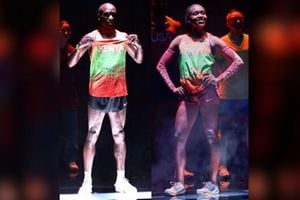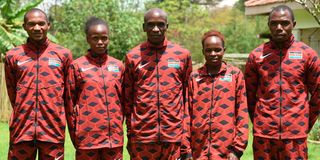
From left: Kenyan marathoners Alexander Mutiso, Brigid Kosgei, Eliud Kipchoge, Peres Jepchirchir and Benson Kipruto after the Kenyan team to the 2024 Olympics Games was named.
The route for marathon races at the 2024 Olympic Games in Paris, set in Île-de-France region in north-central France, places tough conditions on the athletes.
While a marathon is always a challenge for the body, this will be particularly true for the 2024 Paris Olympics, with a route that will include a 436-metre climb, and 438m descent. The maximum gradient on the route is 13.5 degrees.
Add that to the high temperature of 22 degrees Celsius forecast in Paris on the two days of the marathon, and you have a tricky race even for the most experienced athletes.
Aware that they will run their marathon races in hot weather, and on a punishing course, Kenyan marathoners are training in conditions similar to those they expect to find in Paris when the French capital city hosts the 2024 Olympic Games from July 26 to August 11.
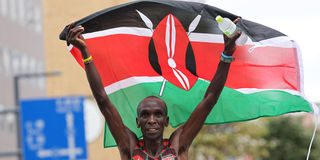
Kenya's Eliud Kipchoge celebrates after winning the men's marathon final during the Tokyo 2020 Olympic Games in Sapporo on August 8, 2021.
Kenya is seeking to retain titles in both the men’s title, and the women’s honours in Paris. In addition, Eliud Kipchoge hopes to write a special chapter in his long distance running career by becoming the first man to win men’s marathon title for the third time in a row.
Apart from Kipchoge, Kenya will field London Marathon champion Alexander Mutiso and Tokyo Marathon champion Benson Kipruto in men’s marathon. Timothy Kiplagat is the reserve athlete.
Kenya will field defending champion Peres Jepchirchir, Boston Marathon champion Hellen Obiri and Boston Marathon silver medallist Sharon Lokedi in women’s marathon.
The athletes have had to relocate their training sessions to hilly areas to adapt.
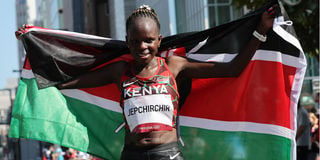
Kenya's Peres Jepchirchir celebrates after winning the women's marathon final during the Tokyo 2020 Olympic Games in Sapporo on August 7, 2021.
Kipruto is among the few athletes who have had a sneak peak of the course. Fresh from competing in the Great Manchester Run in May, Kipruto visited Paris and assessed the course for the marathon, upon which he adjusted his training regime.
“I’m lucky to have seen the marathon course in Paris upon request. It promises to be a tough race. I found the course challenging, and I went back to the drawing board and changed my training programme to factor in thehilly terrain, and hot weather which I expect to find in Paris. I can’t compare the course to that in for Tokyo Marathon which I won, or to that for Chicago Marathon where I came second,” Kipruto who trains under 2Running Club in Kapsabet, Nandi County, said.
The National Olympics Committee of Kenya (NOC-K) and Athletics Kenya has allowed Team Kenya marathoners to train individually, and in various regions ahead of the Olympic Games.
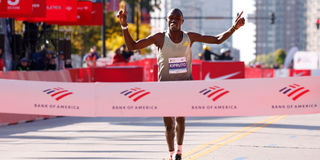
Kenya's Benson Kipruto crosses the finish line to place first in the men's division of the 2022 Bank of America Chicago Marathon on October 9 2022 in Chicago, Illinois.
Kipchoge has been training in the hilly Kaptagat region in Elgeyo Marakwet County. He is a common sight in Chepkorio and Kaptagat, often running up and down the hills and valleys in thea rea along with fellow athletes.
Mutiso trains at altitude in Ngong, Kajiado County, and benefits from the high altitude Ngong Hills, and the surrounding valleys which can be very hot in the afternoons.
On the other hand, Jepchirchir has been training in Kapsabet, Nandi County. Like Kipruto, she shifted her training sessions from dawn to late morning when the sun is up and the weather relatively warm as one way of adapting to hot conditions that she anticipates in Paris.
Lokedi who joined Team Kenya’s marathon line-up last week after Brigid Kosgei picked an injury, has been doing endurance training at Chepkorio which is at high altitude, and is hilly.
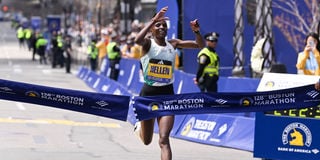
Hellen Obiri of Kenya crosses the finish line to win the women's race during the 2024 Boston Marathon on April 15, 2024.
“The course has roughly 32km which is very tough. If you combine with high temperatures forecast on race days, athletes face a difficult task,” an official familiar with the course told Nation Sport yesterday.
Athletics coach Claudio Berardelli who has studied both the course and the weather pattern in Paris with his athlete Kipruto, says it has taken meticulous planning to arrive at a workable training programme.
“While running in hot conditions, the body struggles, and an athlete has to cool his body with water in most cases. We have introduced things like sauna sessions for athletes, so the body can adapt to the conditions. We also improvise by, for example, ensuring that the athlete wears a lot of clothing while training so as to trigger sweating, which can be likened to hot conditions,” said the coach.
To showcase the performances by women athletes, organisers have reversed the order this year. The women’s marathon will bring a fortnight of intense competition to a close on August 11, the competition’s final day, just a few hours before the closing ceremony, with the men’s marathon taking place the day before.

